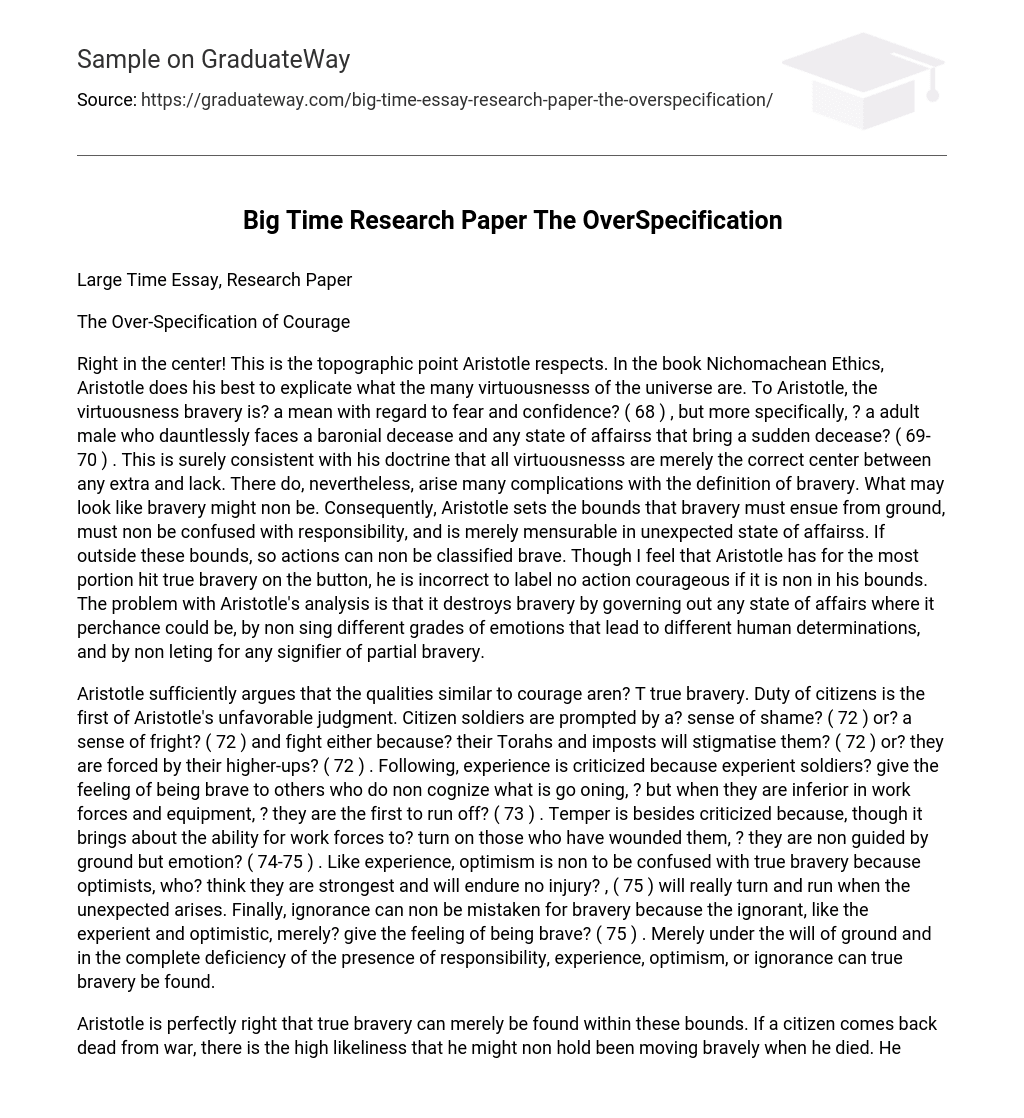Right in the center! This is the topographic point Aristotle respects. In the book Nichomachean Ethics, Aristotle does his best to explicate what the many virtuousnesss of the universe are. To Aristotle, the virtuousness bravery is a mean with regard to fear and confidence but more specifically, a adult male who dauntlessly faces a baronial decease and any state of affairss that bring a sudden decease. This is surely consistent with his doctrine that all virtuousnesss are merely the correct center between any extra and lack. There do, nevertheless, arise many complications with the definition of bravery.
What may look like bravery might non be. Consequently, Aristotle sets the bounds that bravery must ensue from ground, must non be confused with responsibility, and is merely mensurable in unexpected state of affairss. If outside these bounds, so actions can non be classified brave. Though I feel that Aristotle has for the most portion hit true bravery on the button, he is incorrect to label no action courageous if it is non in his bounds. The problem with Aristotle’s analysis is that it destroys bravery by governing out any state of affairs where it perchance could be, by non sing different grades of emotions that lead to different human determinations, and by non leting for any signifier of partial bravery.
Aristotle is perfectly right that true bravery can merely be found within these bounds. If a citizen comes back dead from war, there is the high likeliness that he might non hold been moving bravely when he died. He surely could hold been forced by an officer to contend or hold been excessively scared of the stigma that society would set on him to run off. If either was the instance, so the soldier didn? t act with true bravery. Temper likewise is just to knock. Anyone who is awfully consumed by emotion is non moving in the manner that their natural ground would steer them. In this pots
e angry people are non themselves and their actions to non justify the recognition of the label genuinely brave. As follows, experience, optimism, or ignorance are besides effectual issues to reason upon. If person is bear downing difficult and traveling beyond what normal work forces would try, so they merely might cognize something the remainder Don T. In the instance of ignorance, they might non be moving as they genuinely would. Either manner, it cant be disputed that it would take a sudden state of affairs to see if there was no experience, optimism, or ignorance that gave a adult male a false look of bravery before the sudden state of affairs arose. Aristotle’s definition of true bravery is solid ; it genuinely can merely be measured in non-citizens that are in sudden state of affairss and moving with complete ground.
The problem with Aristotle’s analysis, nevertheless, is that he equates true bravery with all bravery and leaves no room for partial bravery. Just because a soldier is a citizen with responsibilities, he still might move really bravely. He might necessitate merely to be forced by an officer in merely the most utmost of state of affairss. Such would be when the conflict is for all practical intents lost and the enemy out Numberss you one hundred to one. In normal and even really hard conflicts, this soldier may contend difficult and for all the right grounds. I feel this individual is non needfully genuinely brave, but he is still really brave.
Further, when a individual is moving with emotional choler, they are detached from their true ego, but to what degree. Aristotle fails to let for different grades of choler that would switch people different grades off from their true egos. If a soldier were a small spot angry and acted bravely, Aristotle would give him no recognition because the extreme ground was non involved. Last, where is at that place a instance that, experience, ignorance, or optimism is non present.
Unarguably, there is no soldier devoid of either experience or ignorance. If these invalidate any perceptual experience of bravery, we will ne’er happen any illustration of bravery anyplace. Continuing, in Aristotle’s sudden state of affairss, what do we make? How sudden is sudden? How surprised does a soldier have to be for us to be able to see, that when he doesn? t tally off, he is brave? Aristotle has killed the really issue that he hoped to specify. There is nil left of bravery.
I would be really disquieted with Aristotle’s definition of bravery if I were a soldier. He would give me no recognition where it could surely be due. True I may non move with complete ground, I may hold a small experience and optimism, but in most instances, I would surely dauntlessly face a baronial decease. Aristotle has located his prized mean between assurance and fright ; he has found true bravery. It unluckily it exists nowhere in the existent universe.
Ironically, Aristotle has defined bravery by its extreme, and extremes are the really thing that Aristotle sought to derive the most distance from upon the beginning of his statement. Aristotle has singular logical thinking, but look at where it has left him. How blue to merely be called brave if one? endures and fears the right things, for the right ground, for the right motivation, in the right mode, and at the right clip.





